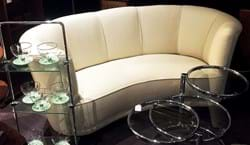
It seems we are in a parallel universe here. On the one hand BADA is complaining of the unfair and unjust new restrictions on the trade in ivory that is about to become law. It has argued that the existing law on items made before 1947 should stand and they should be legally traded and that any further restrictions are unjust and unnecessary.
This appears to be the case, we are told, that BADA is still fighting, arguing that many beautiful items of art would be lost.
And now, at the same time it is asking for more restrictions on the trade in items made from rhino horn. I would have thought the existing laws on this trade are more than adequate.
Once again, the argument is that antique art, made from either ivory or rhino horn, has no relevance to the problem of poaching of either species.
The two are not connected at all. It is purely a Far Eastern market that has no connection to the British antique trade in any way.
Christopher Richardson
Brighton
Marco Forgione, chief executive of BADA, responds:
Our stance on rhino horn is entirely consistent with our approach to ivory.
What we are proposing for objects containing or made of rhino horn is that they must be verified as being pre-1947, of cultural, historic or artistic merit and that the rhino horn element has to be valued at more than $100 per gram, significantly higher than the commodity price.
For the sake of the fast-declining rhino populations, swift and decisive action must be taken to ensure that the UK cannot be used by international criminal gangs, who are feeding the Far Eastern market with ground rhino horn for quack medicinal purposes.
Those dealers I have spoken with agree with our stance.
If we have learned anything from the ivory bill, it is that unless we are seen as part of the solution then our views and opinions, no matter how correct, will be ignored.










